The Biggest Digital Library Conference in the World
An amazing event, in an amazing place
India is an amazing place, and one that broadens the experience of any Western first-time visitor. I was no exception, and my personal conceptual scales for many things have been extended way beyond where they ended before. (I thought that South Londoners, Parisians and Milanese would be obvious contenders for the world championships in dangerous urban driving - until I tried the Delhi rush-hour in a 3-wheel taxi!)
The International Conference on Digital Libraries (ICDL 2004) in New Delhi could have been just another of oh-so-many, but it too extended my own conceptual scale of what can happen at a conference full of (mostly) librarians and, more importantly, my understanding of the potential impact of ‘the digital library revolution’, (that now passé term we were using back in the days when the Follett Report [1] was hot stuff), on the lives of many millions of people who have yet to be reached by the ‘printed library revolution’ initiated by Herr Gutenberg.
ICDL 2004 was the first such conference in India to be organised on a truly international scale, and it attracted more than 740 registered participants from 33 countries in Asia, Africa, Europe, America and Australia. The organisers (TERI - The Energy and Resources Institute, in partnership with the Indian Government departments of Culture and Information Technology) claim that ICDL 2004 was the biggest ever digital library conference organised so far in the world, and it certainly felt like it.
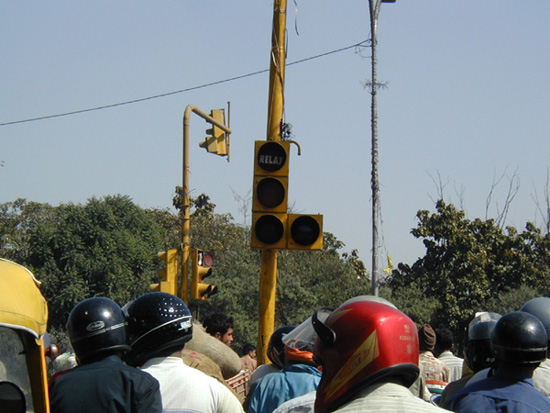
Relaxing view of the Delhi rush-hour
Political significance
The significance of the event was clear from the inaugural address by Dr APJ Abdul Kalam, the President of India. Not the usual ‘Welcome to our esteemed overseas guests, and have a nice conference’, that many of us expected; but about 40 minutes of well-informed discourse on the impact of digital library developments on the emerging Indian knowledge economy, with references to several papers in the three hefty printed volumes of conference and workshop proceedings 2, and including announcements of new State Government initiatives to implement digital land and electoral registries. If I had not already been convinced by the inaugural address that India has the most remarkable and intellectually able Head of State (an aeronautics research scientist, before he ‘retired’ into politics), I would have been by his latest book [3] and the chapter on knowledge economy. I recommend it as reading for anyone who underestimates the effort that this country of a billion people is putting into technology development; along with a browse of the inaugural address [4] on the Presidential Web site.
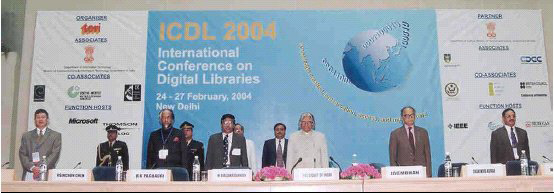
Inauguration of ICDL 2004. From left: Prof. Hsinchun Chen, Professor, Department of MIS, University of Arizona, USA; Dr R K Pachauri, Director-General, TERI; Prof. N Balakrishnan, Professor and Chair, Division of Information Sciences, Indian Institute of Science, Bangalore; Dr A P J Abdul Kalam, Hon’ble President of India; Mr Jagmohan, Hon’ble Minister of Tourism and Culture, Government of India; and Mr Vinod Bhargava, Additional Director, Division of Information Technology and Services, TERI.
Photo by kind permission of TERI
The conference was held at the Habitat Centre in New Delhi, a modern complex with quite good audio-visual facilities and the other usual appointments. After some of the ‘conference catering’ I’ve experienced at UK venues, the copious buffets, with chefs baking fresh naan breads and freezing kulfi to order, all eaten outdoors with the sun just bearably hot (and the ever-present circling kitehawks usually keeping a safe distance until the human diners had finished), tempted me to eat much more than was healthy! And I am now a good judge of which of my local Indian restaurants are really cooking what is eaten by Indians - at least the affluent ones.
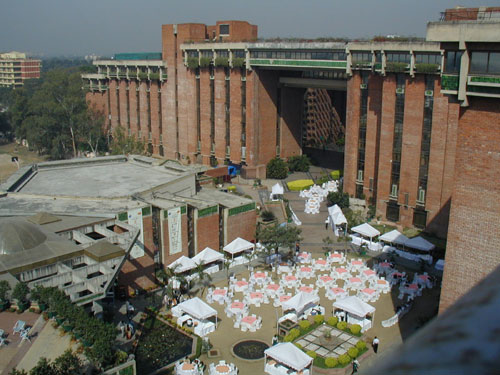
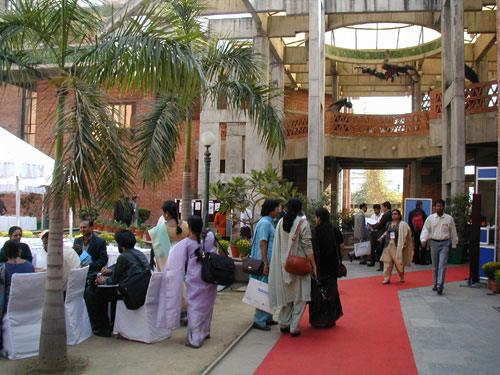
The Habitat Centre, New Delhi
Another measure of the impact of ICDL was the presence as exhibitors and sponsors of many of the major commercial journal and e-resources publishers, who seem convinced that the potential market here is the next big thing in which to invest.
The serious stuff
The first day of the event was devoted to tutorial workshops, and I attended the session on the Greenstone Open Source digital library system, given by Ian Witten of Waikato University, New Zealand. Greenstone is intended to enable cheap and simple deployment of digital libraries to remote places (and its development, while a range of e-content on practical topics such as agriculture and health is sponsored by UNESCO). However it also has greater potential and deserves consideration for use as a platform for collections, (such as archives and other digitised or born-digital resources), in more well-off libraries, which are currently using commercial alternatives that are more expensive to buy and operate, and not as good.
Apart from being a very affable software engineer, Ian is also a rather accomplished clarinet player, and added even more value to his visit with an extended lunchtime cabaret on the final day of the conference.
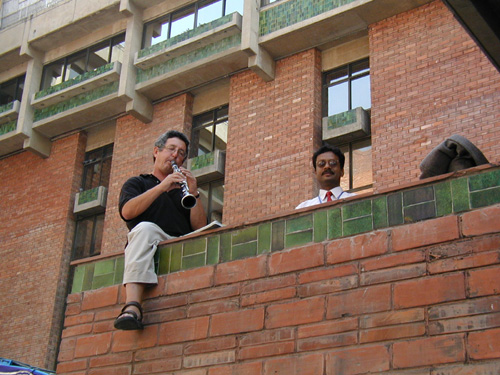
Prof Ian Witten entertains
The main conference programme included over 120 paper presentations in three parallel tracks. Arguably this was too much content packed into too little time, with only 15 minutes each for session keynotes by invited speakers, and 10 minutes for other presenters. Many speakers, delegates and session chairs felt this to be a problem, but it was easy to understand the pressure on the organisers to be this inclusive, and they did a commendable job of keeping reasonably well to the overall timetable. I am not intending to include in this report a blow-by-blow account of all sessions, partly because I could not possibly have attended them all, and mainly because TERI have done a much better job of this in a full report available from their Web site of the ICDL2004 Conference [5].
I was privileged to be one of 55 invited speakers, along with Norman Wiseman of the UK JISC, to ICDL. We both realised that there was a wide range of experience among the audience at many of the sessions, and no general consensus on whether ‘digital library’ is principally about the digitisation of print resources and archive material (of which Indian libraries have a great wealth, raising new issues about preservation and dealing with multiple languages, non-Western character sets, and palm leaves as a medium), or the provision and management of access to new online resources. Norman spoke on JISC’s development of the Information Environment architecture for UK education, and I covered JISC’s Access Management programmes and worldwide developments in that field. There is a great deal of interest among Indian library professionals in the UK model for national coordination of information resources for education; but their community has also developed strong links with Canada and Australia in particular.
Several of the speakers, and many of the delegates, were focussed on addressing what most European libraries would consider very basic issues such as network/Internet connectivity and management. These are things that many of us take for granted, like the water and electricity supplies to our homes, and national consensus about which side of the road to drive on. Just as India still has many millions of households without these fundamentals (and the likelihood that your car will meet an oncoming camel cart in the fast lane of an intercity highway), so there are major telecommunications problems to be tackled before truly egalitarian access to digital libraries (or any other applications and services that depend on a reliable ICT infrastructure) can be a possibility. Some interesting socio-technical projects were described, including mobile digital libraries (complete with generator, satellite dish Internet connection, printer and book-binder) that can bring a choice of books-on-paper to the most remote village, and to some of that significant proportion of the world’s population who have yet to make their first telephone call.
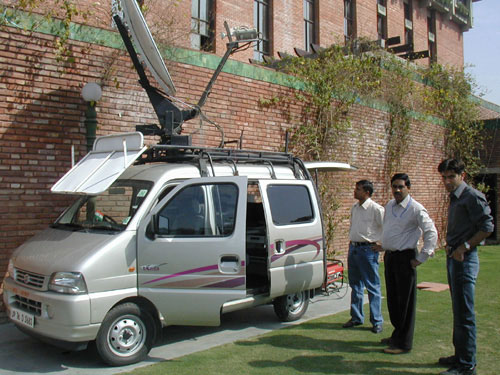
Mobile digital library
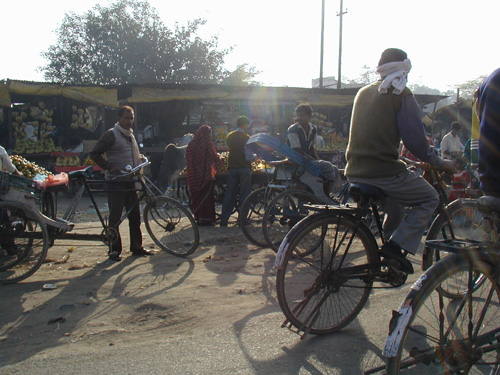
Some Indians for whom digital libraries are not yet the highest priority
It is easy, at first, to jump to the conclusion that the ‘digital library’ issues for India are all about struggling to reach the level of information economy that the so-called developed world already has, and on such a vast scale and with so many other pressing priorities for limited public resources. But the conference, and the knowledge and attitude of the library professionals there, convinced me that India is also addressing the same leading-edge problems that are occupying Europe and the USA. It can make a significant contribution to their solution for all of us, and could well have a working public sector Information Environment, with the full national participation of post-16 education, in a similar timescale to that planned for Britain.
The programme included papers on all of the current ‘hot topics’ I would have expected, some of them covered at a frenetic intensity, to audiences who were not at all reticent to challenge the platform speakers with difficult, well-informed questions and, in some cases, extended ‘points from the floor’. (What is the record time for keeping hold of one of those roving radio microphones?).
Where next?
Most of all, I hope that ICDL 2004 has served to open up channels of contact, and inspire the imaginations of people (inside and outside India) who will do more to overcome the barriers of distance, economy and culture, and include this thriving community of professionals in worldwide developments.
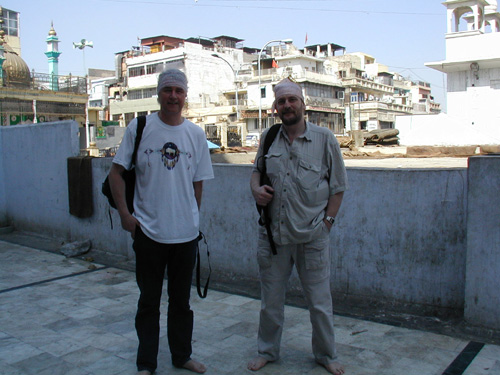
Norman and John explore some cultural frontiers
A potential next step after ICDL 2004, being considered by TERI (which also functions as a postgraduate teaching institution), is the establishment of capacity for postgraduate learning opportunities for library professionals in India, focussing on the latest available digital library technologies and concepts worldwide, and structured to enable maintained contact with international peers, and dissemination to Indian public and academic libraries at state and district levels. This is a development worth watching with interest, and worthy of support from the relevant UK professional bodies. To improve upon the ancient proverb that was quoted by several ICDL speakers:
‘Give a man a fish, and you feed him for a day.
Teach a man to fish, and you feed him for life.
Help him to found a School of Fishing, and you feed his sons, daughters and neighbours, for ever.’
References
- The Follett Report http://www.cpa.ed.ac.uk/reports/follett/
- International Conference on Digital Libraries 2004: knowledge creation, preservation, access, and management. Conference papers. pub. TERI, New Delhi, ISBN 81-7993-029-7
- Kalam, Prof APJ Abdul & Dr A Sivathanu Pilai, Envisioning an Empowered Nation, pub. Tata McGraw-Hill, New Delhi, 2004.
- Inaugural address to ICDL 2004 by the President of India http://presidentofindia.nic.in/scripts/sllatest1.jsp?id=282
- ICDL 2004 event Web site http://www.teriin.org/events/icdl/
